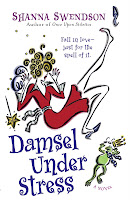STATUS: I’m good actually. Tackled some things on my To Do list. Have two new submissions going out very soon. That’s always exciting.
What’s playing on the iPod right now? LONG COOL WOMAN IN A BLACK DRESS by The Hollies
I’m off to another conference this weekend. I’m refraining from smacking myself in the head. Every year I promise myself that I will only commit to doing 3 (and if pushed) maybe 4 a year—if that.
This year I ended up with 6. How the heck did that happen? But when New Zealand Romance Writers came a-calling to invite me down under, I just couldn’t say no. Do you blame me?
So this weekend is another romance conference (but don’t worry, I’m also going to be attending the Surrey International in Vancouver and that encompasses everything—including literary and commercial mainstream—which I’m always looking for more of.)
Not to mention, I was just recently invited to the World Horror 2008 Convention. I had to ring them back up to make sure they had the right person. After all, I don’t really represent “horror” per se. They said that they did indeed mean to contact me and that I was one of their top choices. Tickle me pink. It’s not a done deal yet but it’s a possibility that’s out there.
But this weekend is a local conference (which means I’m usually game to go because I don’t have to travel). It’s the Romancing The Rockies conference, and my author Linnea Sinclair is one of the keynote speakers.
And yes, there is a point to this blog and I’m getting to it.
My agency always gets a large slew of submissions right after a conference because I got a chance to meet and chat with a bunch of wonderful folks and of course I’ll look at sample pages. That’s the point of the conference after all.
But here’s a secret. Most folks send in their sample pages within a day or two so we get buried quickly.
My suggestion? Wait about 7-10 days, then send. That way we’ve mastered the onslaught and might just have a little more time for a more leisurely read.
One of those agency insider helpful hints.

